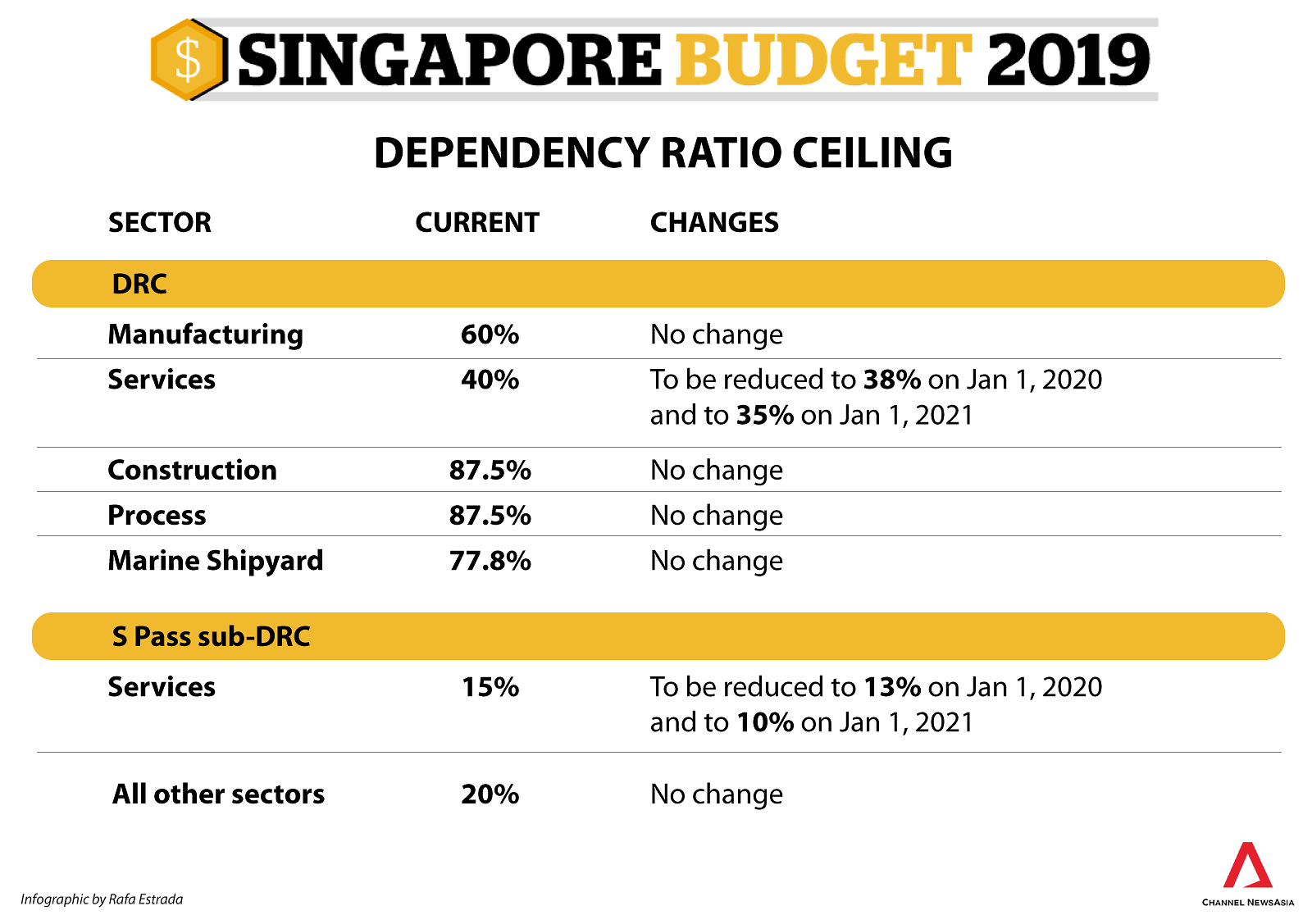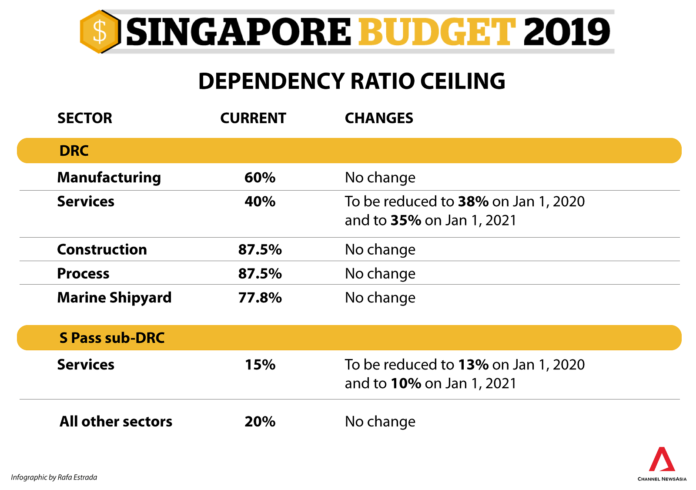SINGAPORE: A number of measures, including reducing the foreign worker quota for the services sector, will be put in place to ensure Singaporeans continue to have “good jobs and opportunities”, said Finance Minister Heng Swee Keat in his Budget 2019 speech on Monday (Feb 18).
The Dependency Ratio Ceiling (DRC) – which sets out the maximum permitted ratio of foreign workers to the total workforce that a company is allowed to hire, will be reduced for the services sector in two steps: from 40 per cent to 38 per cent on Jan 1 next year, and to 35 per cent on Jan 1, 2021.
DRCs for all other sectors will remain unchanged. Current DRCs for the manufacturing, construction, process and marine shipyard sectors stand at 60 per cent, 87.5 per cent, 87.5 per cent and 77.8 per cent, respectively.
In addition, the services sector’s S Pass Sub-DRC will also be reduced in two steps – from 15 per cent to 13 per cent on Jan 1 next year, and to 10 per cent on Jan 1, 2021.
Growth in S Pass and work permit holders in the services sector has picked up pace, said Mr Heng, with the number having risen by 3 per cent a year or 34,000 in the past three years.
With S Pass growth in this sector the highest in five years, foreign manpower growth could be on “an unsustainable path” if the trend persists, said Mr Heng.
“Relying on more and more foreign workers is not the long-term solution – other economies are developing too,” he added. “What we need is to have a sustainable inflow of foreign workers to complement our workforce, while we upgrade our Singaporean workers and build deep enterprise capabilities in these sectors. We must enhance the complementarities of our local and foreign workers.”
The announcement, which comes one year ahead of the changes, will give companies “time to prepare”, Mr Heng said.

Reduction in Dependancy Ratio Ceiling (DRC).
For firms whose existing workers are in excess of the new limits, the DRC will apply as and when these firms apply for renewals of permits.
“The basic approach to our foreign worker polices has remained consistent,” said Mr Heng. “Based on evidence on the pace of foreign worker inflows, and the progress being made in raising productivity across sectors, we need to calibrate our policies.
“The Government recognises the economic headwinds and cost pressures ahead of us. But if we do not take action early, our firms will find it harder to compete in the years ahead, and our workers will be left behind.”
While foreign worker levy rates will stay the same across all sectors, the previously announced levy increases for the marine shipyard and process sectors will be deferred for another year, as they have “only begun showing early signs of recovery”, added Mr Heng.
The levy rate for the basic tier of work permit holders in the marine shipyard sector is currently S$300 for higher-skilled workers and S$400 for basic-skilled workers.
The levy rate for the basic tier of work permit holders in the process sector is S$300 for higher-skilled workers and S$450 for basic-skilled workers.
To help firms adjust to the impending foreign workforce policy changes, the Government will extend the enhanced support levels of the Enterprise Development Grant (EDG) up to Mar 31, 2023, said Mr Heng.
Announced at last year’s Budget, the EDG provides enterprises with up to 70 per cent government funding to undertake projects to strengthen their business capabilities, improve operational efficiencies and internationalise.
The Productivity Solutions Grant, also announced at last year’s Budget, will also be extended to Mar 31, 2023. It will also be enhanced to include a component that supports worker upgrading.
Eligible enterprises will receive a subsidy for up to 70 per cent of their out-of-pocket training expenses – the remaining amount not already covered by other Government training subsidies. The subsidy will be capped at S$10,000 per enterprise.
INVESTING IN SINGAPOREANS
Singaporeans also need to be “nimble” to build industry-relevant skills throughout their lives, said Mr Heng.
“The ultimate goal is to enable our people to continue to have good jobs and opportunities, and be at their best,” he said. “Hence, the second thrust of our economic transformation in this budget is to deepen the capabilities of our workers.
“We want our people to have the skills, knowledge, and attitude to adapt and thrive in this competitive and technology-intensive environment.”
The leadership of companies play a key role in raising the capabilities of workers, but the Government will continue to “invest” in Singaporeans across all stages of their lives, said Mr Heng.
One of the measures to help workers in their careers has been the Professional Conversion Programmes (PCPs), which are targeted at professionals, managers, executives and technicians including mid-career switchers, to undergo skills conversion and move into new occupations or sectors that have good prospects and opportunities for progression.
More than 100 PCPs have been launched in about 30 sectors since its establishment in 2007. This year, the Government will launch new PCPs relating to blockchain, embedded software and prefabrication to prepare Singaporeans to move into new growth areas, said Mr Heng.
The Career Support Programme, launched in to 2015 to provide wage support for employers to hire eligible Singaporeans who are mature and retrenched, or in long-term unemployment, will also be extended for two years until March 2021.





